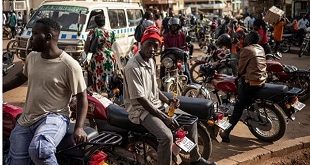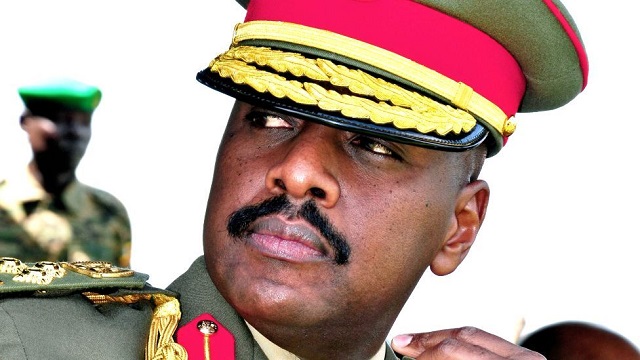
Year Gen. Muhoozi came out
Kampala, Uganda | THE INDEPENDENT | January
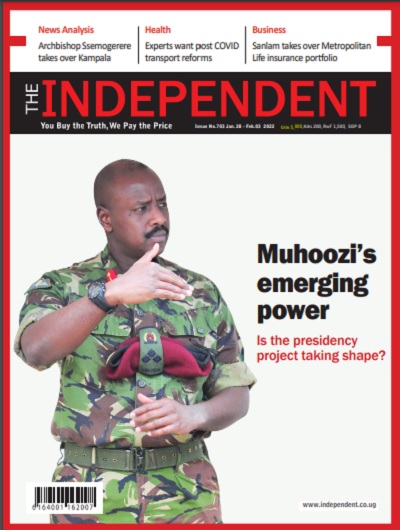
Jan. 5: Widespread condemnation of the Ugandan government after horrendous images of a tortured Kakwenza Rukirabashaija, a writer and novelist, become public. Kakwenza was tortured by security agents after he sent out a tweet about First Son Gen. Muhoozi, then UPDF Commander of Land Forces.
Jan. 10: Schools reopen in Uganda after going through the world’s longest shutdown related to Covid19. Night curfew is also lifted countrywide.
Jan. 25: Maj. Gen Katsigazi Tumusiime is appointed Deputy Inspector General of Police. The post was vacant for five months after the sudden death of Lt. Gen Paul Lokech who succumbed to a blood clot while at his home in Kampala.
Jan. 31: First Son Gen. Muhoozi visits Kigali, Rwanda in a move aimed at normalising ties between Uganda and Rwanda after years of mutual hostility and counter accusations. Rwanda reopens border to Uganda after three year closure.
February
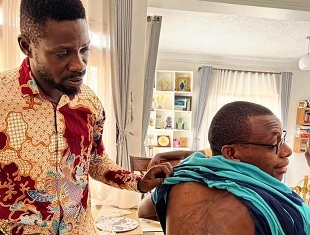
Feb. 9: Kakwenza Rukirabashaika, a critic of President Yoweri Museveni and First Son Gen. Muhoozi Kainerugaba, flees into exile following days in detention where he is tortured by security agents believed to be acting on the orders of Gen. Muhoozi.
Feb. 9: Opposition leader Robert Kyagulanyi aka Bobi Wine asks the European Union parliament to act on President Museveni over torture and human rights abuses. He says, “The torture in my country does not just need EU to issue a statement but to do more….”
Feb.9: The International Court of Justice (ICJ) in a ruling orders Uganda to pay $325 million as compensation for its armed activities on the territories of the DRC in a case that was filed in 1999.
Feb. 10: A coffee agreement is signed between the government of Uganda and Uganda Vinci Coffee Company Limited. The deal awards Vinci exclusive rights to process and export Uganda coffee Ltd, sidelining Ugandan coffee farmers. At the centre of the deal is Enrica Pinetti, a controversial Italian businesswoman with close ties to President Museveni.
March
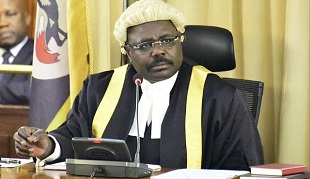
March 2: Uganda abstains in a UN vote condemning Russia’s invasion of Ukraine. Uganda’s Ambassador to the UN Adonia Ayebare says Uganda’s decision is inspired by its status as chair of Non-Aligned Movement
March 20: Speaker of Parliament Jacob Oulanyah passes on at a hospital in the U.S. after a long illness. Oulanyah had been Speaker for just 10 months and spent most of the time away from his duties.
March 25: Anita Among is elected Speaker of Parliament, replacing Oulanyah and trouncing the opposition candidate by a mile. Thomas Tayebwa is elected Deputy Speaker
March 31: Chief Justice Owiny-Dollo visits Mengo to apologise to Buganda Kingdom after comments he made on Kabaka Mutebi flying the presidential jet for medical treatment abroad. Owiny-Dollo met with Katikkiro Peter Mayiga.
April
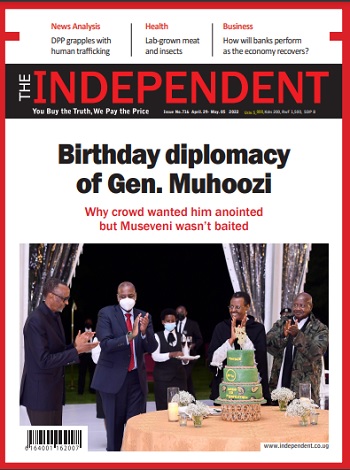
April 1: African Union Transition Mission in Somalia becomes the new name of the 15-year long peacekeeping mission in Somalia. Uganda is the anchor troop contributing country with an estimated 6000-strong contingent.
April 5: Leaders of the opposition National Unity Platform (NUP) accuse UPDF of being behind the killings and cattle rustling happening in Karamoja sub-region. NUP leaders said on several occasions UPDF raided villages in the name of fighting warriors.
April 23: A Birthday run and celebrations are held for First Son Gen. Muhoozi at Lugogo Cricket Oval in Kampala. Muhoozi turned 48 and it was the start of nationwide activities drumming up his presidential bid.
April 24: Rwandan President Paul Kagame attends a birthday dinner held in honour of Gen. Muhoozi at State House Entebbe. Kagame was invited by his counterpart, President Museveni and it was his first visit since 2018.
May
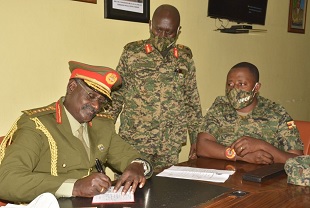
May 18: Parliament votes to terminate the agreement between the government and Uganda Vinci Coffee Company Limited (UVCCL), after weeks of controversy. The agreement was castigated for giving the company a monopoly.
May 24: Opposition guru Dr Kizza Besigye launches street protests in the central business district protesting rising cost of living amid government corruption and wastefulness
May 26: Gen. David Sejusa signs his retirement documents from the UPDF, capping a long battle by the former guerilla to retire from the army that began in 1996.
May 27: Uganda hosts East African Armed Forces Field Training Exercise in Jinja, eastern Uganda. The two week exercise included troops from all the East African Community (EAC) partner states Uganda, Tanzania, Rwanda, Burundi, South Sudan, and Kenya. The EAC’s newest member, DRC, sent 10 observers.
June
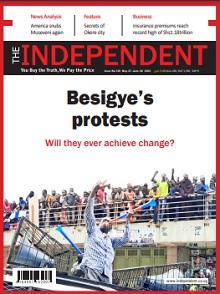 June 8: President Museveni assents to eight Bills passed by the 11th parliament in its first session.
June 8: President Museveni assents to eight Bills passed by the 11th parliament in its first session.
June 14: New York-based Congo Research Group releases report critical of UPDF’s Operation Shujaa, the excursion in eastern DRC meant to hunt down ADF. Report says the mission is likely driven by money
June 15: Ugandan arts teachers declare strike demanding government to increase their pay. This was provoked by the government’s decision to raise the salaries of their science counterparts by 300 percent.
June 23: President Museveni attends Commonwealth summit in Kigali, Rwanda. He receives a rapturous welcome after crossing the Rwandan border by road.
July
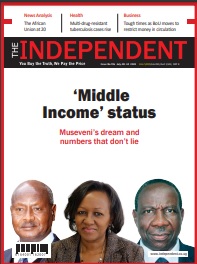
July 20: Norbert Mao, the President-General of the Democratic Party (DP), signs a cooperation agreement with President Yoweri Museveni, chairman of the NRM at State House Nakasero.
July 21: President Museveni appoints Mao minister of Justice and Constitutional Affairs as part of the agreement.
July 22: In a letter, Gender and Labour Minister Betty Amongi asks NSSF MD Richard Byarugaba to leave office on the basis of clocking retirement age of 60.
July 25: Gangs attack a police checkpoint on the Kampala Gulu Highway in Luweero hacking two police officers to death and fleeing with guns.
August
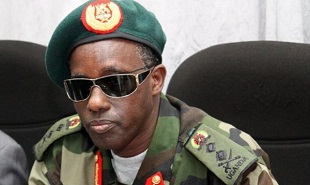
August 2: Opposition kingpins Dr. Kizza Besigye and Bobi Wine sign cooperation agreement to work together after a string of losses in by-elections. Leaders of JEEMA and PPP, two other minority opposition parties are part of the agreement.
August 9: Dr. Besigye and Bobi Wine are in Kenya as election observers for the hotly contested election for Kenya’s fourth president that was won by William Ruto.
August 16: Newly appointed Government Chief Whip Hon. Hamson Obua takes office from his predecessor, Deputy Speaker Thomas Tayebwa.
August 25: Gen. Elly Tumwine dies at Aga Khan Hospital in Nairobi. A former army commander and minister for security, Tumwine was also known for firing the first shot as NRA launched its guerilla war in 1981.
September
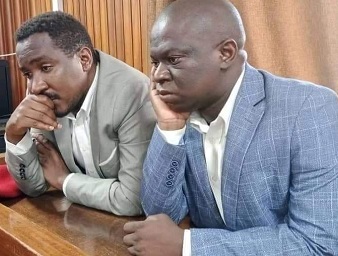
Sept.7: Opposition MPs, Allan Ssewanyana and Mohammed Ssegirinya mark a year in jail on what is widely believed to be trumped up charges. The charges are in connection with the killings in Masaka that happened in 2021.
Sept.13: Parliament’s Committee on Commissions, Statutory Authorities and State Enterprises (COSASE) directs the Uganda Airlines CEO, Jennifer Bamuturaki, to sort out the discrepancies surrounding her name. Joel Ssenyonyi, the committee chairperson, gave Bamuturaki an ultimatum of two weeks to respond.
Sept.13: President Museveni attends inauguration of Kenyan President William Ruto in Nairobi. He is introduced as the “father of our region” by Ruto and speaks on behalf of heads of state. It was the third Kenyan presidential inauguration Museveni was attending.
Sept. 15: European Parliament passes resolution stopping East Africa Crude Oil Pipeline (EACOP), Uganda’s signature oil and gas project. EU parliament raises concerns over environmental concerns sparking backlash from the Ugandan government over entrenching “energy poverty” in poor countries.
October
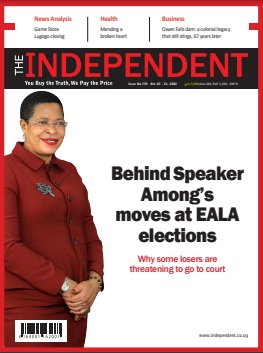
Oct.3: Gen. Muhoozi Kainerugaba tweets about Uganda invading Kenya causing uproar on social media. His father, President Museveni, apologises on his behalf and fires him as UPDF Commander of Land Forces. He also promotes him to General.
Oct.9: Uganda marks 60 years of independence. Kenyan President William Ruto attends low key fete at Kololo Ceremonial Grounds.
Oct.25: 11 pupils at Salama School of the Blind in Mukono district perish after fire guts their dormitory. Scores of students were also injured in the fire that broke out in the dead of night.
Oct. 31: Bandits armed with machetes attack Busiika Police Station in Luweero district, hacking two police officers to death and fleeing with two guns. They left two other police officers injured heightening anxiety and insecurity in the country.
November

Nov. 4: President Museveni rules out lockdown in Kampala as Ebola cases spread out to the capital creating a public health alert
Nov.13: A Police post in Kyanja is attacked by thugs who shoot at the post in a continuing spate of attacks on police posts in the country. The attempt to grab gun fails but police is placed on a high alert as the attacks seem coordinated.
Nov.17: Ugandan torture victims appear at a human rights conference in Nairobi narrating their ordeals at the hands of Ugandan security officers. The victims breaking down, bore horrible scars after months in torture chambers. The conference elicited sweeping condemnation of the Ugandan government.
Nov.23: President Museveni travels to Vietnam for first state visit in the pandemic era. He signed cooperation agreements with his Vietnamese counterpart in areas of agriculture, ICT, health etc.
December
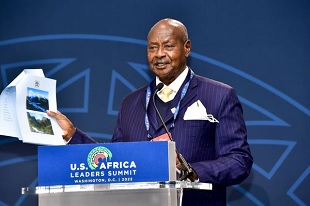
Dec.2: Uganda discharges last Ebola patient after three months of the viral disease outbreak that claimed 56 lives. Ebola broke out in the districts of Mubende and Kasanda with cumulated cases hitting 142.
Dec.4: Government tables list of 40 countries Ugandan travelers can visit without paying visa fees.
Dec.9: Former IGP General Kale Kayihura is sanctioned by the U.K. The U.K. Global Human Rights Regime sanctioned in a statement saying while he was IGP, “he oversaw multiple units responsible for human rights violations including torture and other cruel, inhuman or degrading treatment and punishment.”
Dec.13:President Museveni joins several African leaders at the second U.S. Africa Leaders Summit held in Washington D.C. First time Museveni is visiting the U.S. since 2017.
 The Independent Uganda: You get the Truth we Pay the Price
The Independent Uganda: You get the Truth we Pay the Price


